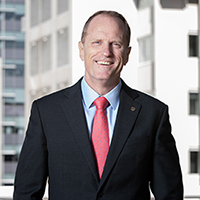Andrew McConville
 Andrew McConville
Andrew McConville
The power of one
As coal-fired power stations are progressively retired and Australia grapples with its transition to renewable energy production, UNE alumnus Andrew McConville is charting a slightly different path forward.
He sees our nation's rich reserves of oil and gas, particularly gas, as central to both our nation's post-COVID recovery and the large-scale uptake of renewables.
The chief executive officer of the Australian Petroleum Production and Exploration Association (APPEA) graduated from UNE in 1991 with a Bachelor of Agricultural Economics (with first class honours). During the past tumultuous 18 months he has emerged as an effective advocate for his industry, capable of separating the "noise from the sentiment".
"It's a very interesting time," Andrew says. "On the one hand we have the importance of gas, particularly, to Australia's economy - $50 billion worth of exports, 80,000 jobs, $350 billion worth of investment over the past 10 years - a major, major industry. Then we have the heightened community and environmental concerns about fossil fuels, and questions over their future role in a low-emissions world economy committed to meeting the Paris emissions reductions targets.
"We don't yet have the technology and storage capacity to shift to 100% renewable energy; in many ways gas is the battery we don't yet have. I'm dedicated to shaping good policy that continues to support oil and gas exploration and ensures the development of renewables, which natural gas can strongly complement during peak demand.
"Oil and gas are key inputs into Australia's manufacturing sector and we are very fortunate to have literally hundreds of years' worth of gas beneath our feet. Ensuring adequate supply will put downward pressure on prices and ensure Australians have access to affordable energy."
Upon graduating from UNE, Andrew earned a travelling scholarship to study for a Master of Science and Agricultural Economics at Oxford University. Returning to Australia, he cut his teeth working in policy reform with the Victorian Government, including the privatisation of grain handling and designing that state's water trading rights regime, before taking on the role of government relations manager with the Australian Wheat Board. Articulate and persuasive, Andrew says while he might not have been the world's finest micro-economist he had a knack for explaining how economies worked.
Positions in the National Australia Bank and his own private agribusiness public relations firm parlayed into a decade-long stint in Asia and Europe with Syngenta, one of the world's leading agribusinesses. He was global head of external affairs and communication, based in Switzerland, before taking up the APPEA post and believes international travel has afforded him valuable insights.
"I have sat on dirt floors with farmers in India and talked about their aspirations," Andrew says. "The path to economic development is a simple one: the first thing a farmer does is to feed his family; the second thing is to send his kids to school; and the third thing is to turn the lights on, so his kids can study.
"Thankfully, Australia has been blessed with incredible natural resources and we can easily forget that our prosperity and success has been built on energy security. We can provide that energy and food security for other parts of the world and I think we have an obligation to do that, sustainably and responsibly."
Throughout his professional career, Andrew says he has layered experiences, choosing positions based largely on his affinity for rural Australia and resource development. Things really took off when he accepted the public affairs role with Syngenta and arrived in Singapore to lead a team of one. "By the time I moved to Switzerland in 2017 we had 53 people across 17 countries running public affairs and advocacy," he says. "For me, it brought everything together - the agriculture, the policy, the advocacy and the meaning."
Looking back, Andrew believes his UNE experiences were fundamental in shaping him - and not just academically. He received a half blue and a full blue for rugby at UNE and captained the Robb College first XV and UNE, as well as playing for NSW country. Although he didn't ever reside in college, Andrew shared the Ben Meredith Prize for his contributions to Robb in his final year.
"My time at UNE taught me the importance of being prepared and having the confidence to have a go and back yourself, but also the merits of a fabulous network," he says. "When I worked in agriculture I used to run into UNE people all over the world and they were always really good people and highly respected. They punched well above their weight and that's something that UNE should be extremely proud of."

